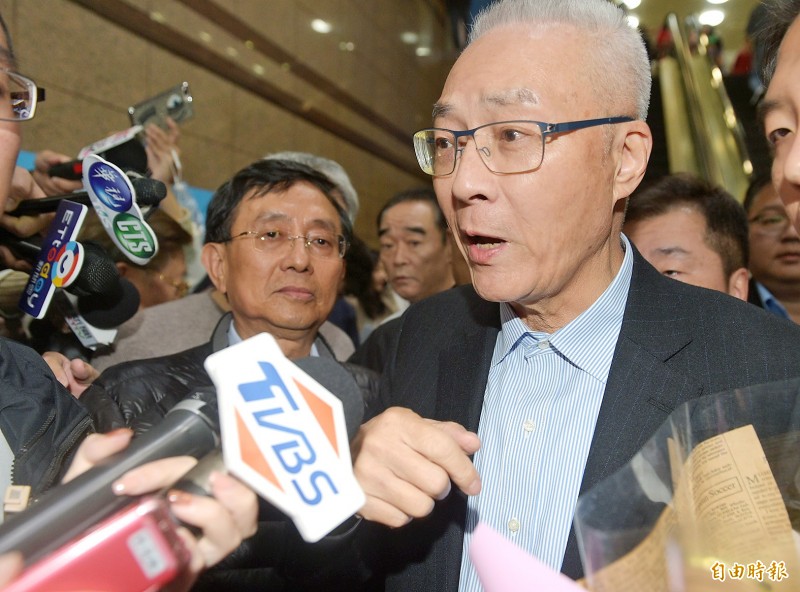《TAIPEI TIMES》 Wu quits over KMT election defeats

Outgoing Chinese Nationalist Party (KMT) Chairman Wu Den-yih talks to reporters after chairing a meeting of the party’s Central Standing Committee in Taipei yesterday. Photo: Chang Chia-ming, Taipei Times
KMT REPORT: The party blamed ‘Internet armies,’ the party’s choice of legislator-at-large nominees and its inability to win over young people for it results the elections
By Shih Hsiao-kuang / Staff reporter
Chinese Nationalist Party (KMT) Chairman Wu Den-yih (吳敦義) yesterday offered his resignation to the KMT Central Standing Committee, while the party listed in a report seven major reasons for its defeat in Saturday’s elections.
After Wu’s resignation, the committee appointed KMT Legislator William Tseng (曾銘宗) as acting secretary-general to oversee the party’s operations.
In the report, the KMT said the major factors in its defeat were that the “sense of the nation’s impending doom” (亡國感) was greater than “hatred toward the Democratic Progressive Party [DPP]”; the KMT could not control the discussion on cross-strait relations and respond to changes; “Internet armies” swayed public opinion, challenging candidates’ images and making it difficult for them to win over independent voters; the victory in Kaohsiung’s mayoral election could not be replicated and a mistake was made regarding the choice of campaign strategy; internal conflicts within the party, lack of unity and campaigning that could have been improved; the party’s list of legislator-at-large nominees did not meet public expectations; and the party was unable to win the favor of young people, who are highly engaged in politics.
The report said that because Kaohsiung Mayor Han Kuo-yu (韓國瑜), the party’s presidential candidate, announced his candidacy less than six months after becoming mayor, his trustworthiness was questioned.
Han’s “repetitive” responses at the Kaohsiung City Council and failure to follow through on policy proposals, such as bringing Disneyland to the city, also raised questions about his capabilities, the report said.
His private life was put to the test, the report said, listing his verbal gaffes, “discriminatory” comments, illegal farmhouse and real-estate investments, as well as a photograph of him playing mahjong and his relationship with a woman surnamed Wang (王).
His “everyman” image was hurt, it added.
While Han’s every word and action was scrutinized, his campaign team was unable to respond with strong evidence in a timely fashion, it said.
The imprecision of the responses made his campaign vulnerable to his opponents’ attacks, it said.
His campaign “avoided” scrutiny by broadly saying that he was being smeared or “painted red” or “painted yellow,” the report said.
The DPP, along with media outlets and “Internet armies,” ran a smear campaign and created an image of Han as a caobao (草包, “country bumpkin”), it said.
This damaged Han’s efforts to win over young and independent voters, it added.
Young people care about various social issues, but the KMT’s stance on many of those issues is either at odds with young people’s views or is seen as conservative, the report said.
Chinese President Xi Jinping’s (習近平) proposal to impose a “one country, two systems” formula for Taiwan at the beginning of last year, as well as protests in Hong Kong, resulted in the success of the DPP’s strategic use of a “sense of the nation’s impending doom,” it said.
A case involving self-confessed Chinese spy William Wang Liqiang (王立強) further increased concerns about Chinese interference in domestic affairs, it said.
Although the KMT has a clear cross-strait policy, it has been unable to “adjust its pace” to changing situations, the report said.
Revisions to the party’s nomination process meant candidates with political influence were unwilling to participate, the report said, adding that after the party’s primary ended not all candidates supported Han, despite promises to do so.
The process of nominating at-large legislative candidates also hurt the KMT’s image, the report said.
新聞來源:TAIPEI TIMES
















